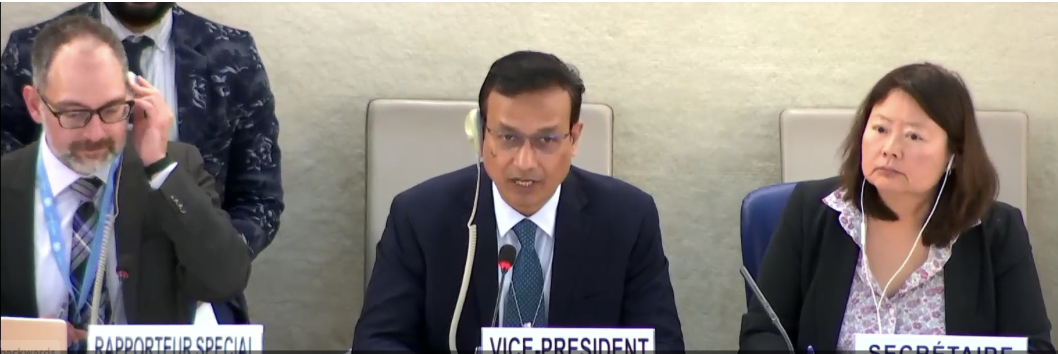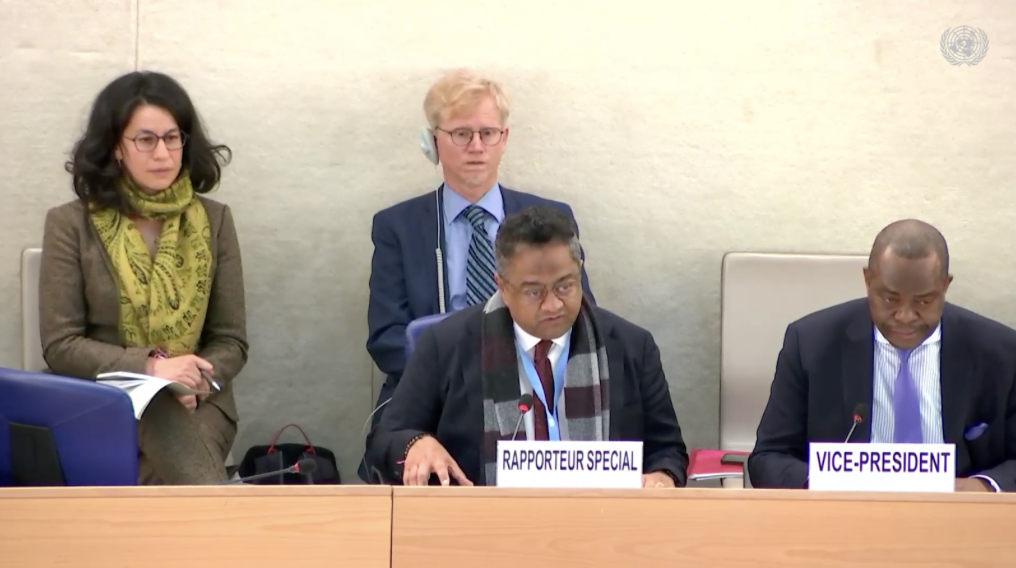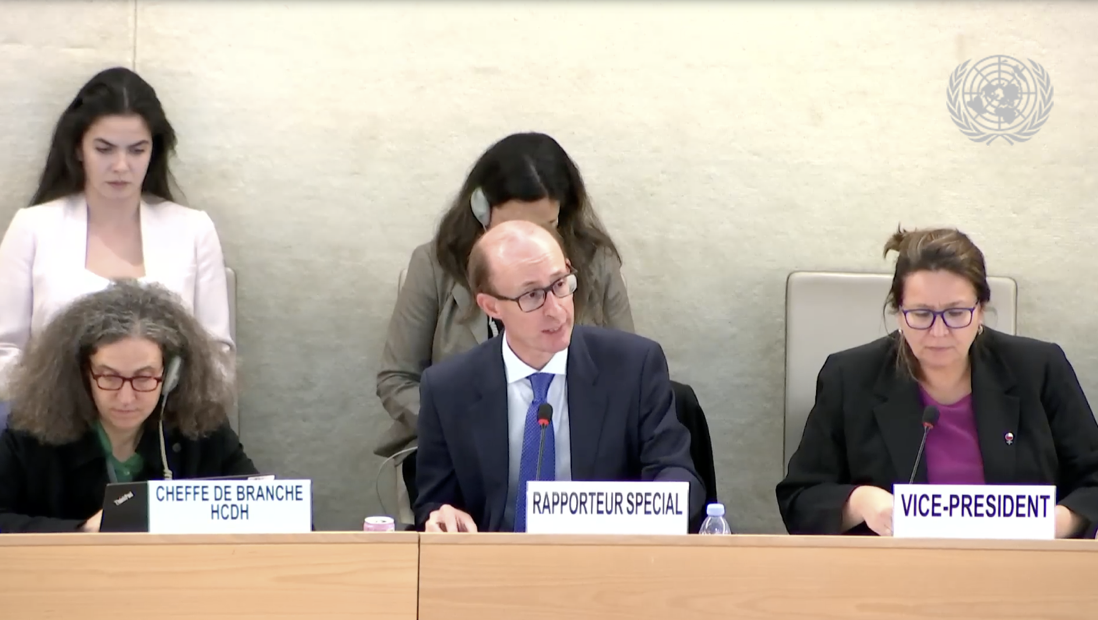HRC56: Trafficking in Persons, Mixed Migration and Protection at Sea
The 56th Session of the United Nations Human Rights Council
18 June – 12 July 2024
Agenda Item 3: Interactive Dialogue with the Special Rapporteur on Trafficking of Persons, especially Women and Children.
26 June 2024

By Mildred Asiimwe / GICJ
Executive Summary
On 26 June 2024, the United Nations Human Rights Council (UNHRC) convened an Interactive Dialogue with Ms Siobhán Mullally, the Special Rapporteur on Trafficking in Persons, especially Women and Children. The position of Special Rapporteur was created after the adoption of decision 2004/110. The Special Rapporteur focused on the human rights aspects of the victims of trafficking in persons, whose mandate has a global reach and engages widely with law and policy fora and civil society.
In delivering her mandate, the Special Rapporteur took action on violations committed against trafficked persons and on situations in which there has been a failure to protect their human rights. This was done through undertaking country visits to study the situation in situ, formulating recommendations to prevent and/or combat trafficking and protect the human rights of victims of trafficking in specific countries and/or regions, and submitting annual reports to the UNHRC and the General Assembly.
Geneva International Centre for Justice (GICJ) urges governments, the international community and donor agencies to prioritise the rights of victims of trafficking, especially women and children, because they are the most vulnerable in situations of armed conflict, which is both an enabler and a root cause of human trafficking.
Background
In her report, Ms Siobhán Mullally stated that at least 8,500 persons died on migration routes worldwide in 2023, making it the deadliest year on record. This number represents a 20% increase compared to 2022. She maintained several issues that exacerbate the vulnerability of displaced persons, including victims of trafficking at sea, who are often perceived as without rights, and internal and cross-border displacements heighten risks of trafficking in opine persons. At the end of 2022, 108 million people were forcibly displaced, with children accounting for 40% of all forcibly displaced people.
She urged States to strengthen action to prevent human trafficking by expanding access to safe, regular migration pathways and to strengthen refugee protection and access to asylum to reduce the risks arising from dangerous journeys by sea. She reiterated that this aligns with the Multi-Stakeholder Pledge on Developing Comprehensive Responses to the Protection Challenges Faced by Refugees and Migrants Moving by Sea, presented at the Global Refugee Forum 2023. She further called upon States to commit to protecting displaced persons by expanding safe, regular migration opportunities, providing family reunifications, resettlement opportunities, and other complementary pathways for the admission of persons with international protection needs. All these are essential for the prevention of trafficking in persons.
Ms Mullally emphasised that women and children are the most affected of all forcibly displaced people. Furthermore, the challenges faced by displaced children are exacerbated by pre-existing factors such as weak child protection systems, limited access to social protection, poverty and inequality and failure in the application of the rule of law, among others. Family fragmentation, loss of livelihoods, stress, displacement into relief camps, and heightened physical and socioeconomic challenges all contribute to increased risks of trafficking, particularly among women and children.
Human Rights Council Resolution 53/9 extended the Special Rapporteur's mandate for three more years in June 2023. As part of this mandate, the Special Rapporteur's office has addressed or made efforts to address some of the challenges faced by migrants, including the following:
- The need for effective search and rescue operations at sea to ensure the right to life of all individuals, including victims of trafficking, with obligations for maritime actors to assist those in distress without discrimination.
- States should prevent trafficking in persons and protect victims at sea, including child victims, by expanding safe migration opportunities, providing access to asylum, and ensuring accountability for trafficking.
- Governments should adhere to the principle of non-punishment for all unlawful acts committed due to being trafficked, including immigration-related offences. States are further urged to ensure effective access to justice and safe reporting without fear of detention, deportation, or penalty for victims of trafficking.
- Ensuring access to asylum procedures, protection, and assistance for intercepted or rescued individuals at sea who are victims of trafficking or at risk of being trafficked without discrimination or preconditions.
Effective Access to Asylum
The Special Rapporteur highlighted the need for more shared responsibility and pathways for admitting persons with international protection, which must be made available more systematically, sustainably, and gender-responsively, must be made available on a more systematic, sustainable basis. She expressed concern about passing legislation that prevents or seeks to restrict access to international protection, such as punitive responses to migration at sea and the transfer of refugees to third-party countries, as factors that undermine efforts to assist asylum seekers. She commended states for their efforts to assist in combatting forced displacements and encouraged them to continue.
Trafficking-related risks, including for purposes of sexual exploitation, child and forced marriage, and child and forced labour, have been identified in protection clusters and humanitarian settings. Of particular concern are the patterns of increased trafficking in situations of armed conflict, which leads to denial of humanitarian access. Despite all these, there are limited dedicated staff for the protection of trafficked persons.
Visit to South Sudan in December 2023
Ms Mullally highlighted some issues from her visit to South Sudan in 2023, including conflict-related trafficking, trafficking due to violence as well as trafficking of children for child marriages and child labour, among others. All these were worsened by internal strife, poverty, gender inequality, climate change, and recruitment and use by armed forces. She noted the prevalence of systemic gender inequality and widespread sexual and gender-based violence (GBV) were contributors to the impunity for human trafficking. She noted the limited assistance to trafficked people and called for safe assistance, including reproductive and sexual healthcare, accommodation, psychosocial assistance and availability of employment opportunities.
She commended South Sudan for implementing measures to host refugees despite the country’s own challenges stemming from internal displacement of persons. Such challenges have significantly increased with the arrival of refugees from Sudan. She, therefore, called for further urgent support for both Sudan and South Sudan.
Visit to Bangladesh in 2022
During her visit, Ms Mullally learnt that Bangladesh is host to almost one million Rohingya refugees. She, however, expressed concern at the limited attention given to internal trafficking for purposes of sexual exploitation, child marriage, and child and forced labour. Women are especially vulnerable, with girls as young as 12 trafficked to Malaysia for marriage and child labour. On this front, she called upon the international community to continue to provide and expand support to Bangladesh.
In her concluding remarks, she highlighted the plight of the Rohingya refugees, thanked the Cox’s Bazar and other international refugee agencies and called upon the international community to give more support to Bangladesh.
Interactive Dialogue
 The delegate of Bangladesh agreed with the Special Rapporteur’s report saying it reflected the progress made by the government of Bangladesh towards addressing trafficked persons, especially women and children. Bangladesh has a zero-tolerance policy towards human trafficking and signed/became a party to the UN Organisation against Transnational Organised Crime in 2011 and is a signatory to the protocol to prevent, suppress and banish and suppress trafficking of all persons, especially women and children (Palermo protocol). Other measures to curb human trafficking include the Bali process and an international forum that focuses on trafficking prevention.
The delegate of Bangladesh agreed with the Special Rapporteur’s report saying it reflected the progress made by the government of Bangladesh towards addressing trafficked persons, especially women and children. Bangladesh has a zero-tolerance policy towards human trafficking and signed/became a party to the UN Organisation against Transnational Organised Crime in 2011 and is a signatory to the protocol to prevent, suppress and banish and suppress trafficking of all persons, especially women and children (Palermo protocol). Other measures to curb human trafficking include the Bali process and an international forum that focuses on trafficking prevention.
At the national level, Bangladesh has enacted the Prevention and Suppression of human trafficking Act, implemented the National Action Plan 2018-2022 for SDG for the fight against human trafficking, established a counter-trafficking committee in each tier of local government, anti-human trafficking tribunal for swift trials of human trafficking offences, enacted the suppression of human trafficking Act, and partnered with India to constituted RRRI taskforce (Rescue, Recovery, Repatriation) and Integration of trafficked victims and maintained a database to that effect. In collaboration with the EU, Bangladesh has developed a digital tool to facilitate the repatriation of trafficked victims and has repatriated about 2,500 formerly trafficked citizens. The victims received food, accommodation, medical and consular support.
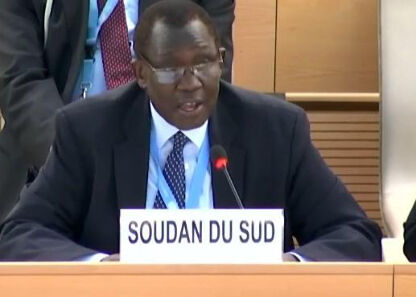 The delegate from South Sudan reiterated that the government of South Sudan facilitated the visit of the Special Rapporteur by ensuring constructive dialogue with government agencies, community leaders, women groups, and displaced persons, among others. He commended Ms Mullally for recognising the measures taken by his government to end human trafficking, including the adoption of the Comprehensive Action Plan to end grave violations against children, the Action Plan on armed forces to address conflict related to sexual violence, and the adoption of the National Strategic Plan to end child marriage in South Sudan. The transitional constitution prohibits human trafficking in the country. The government has addressed gender inequality by allocating 35% of all jobs to women, including the position of Parliament Speaker and State Ministers. The government is dealing with child and women abductions by holding inter-community dialogues, healing and repatriation and peaceful policies. There is a special court for sexual and gender-based violence and mobile military and juvenile courts to end the impunity that has not been condoned by the government since 2020. The government of South Sudan established a joint verification committee for children affected by armed conflict, whose efforts resulted in the rescue of several children from armed groups, who were later reunited with their families.
The delegate from South Sudan reiterated that the government of South Sudan facilitated the visit of the Special Rapporteur by ensuring constructive dialogue with government agencies, community leaders, women groups, and displaced persons, among others. He commended Ms Mullally for recognising the measures taken by his government to end human trafficking, including the adoption of the Comprehensive Action Plan to end grave violations against children, the Action Plan on armed forces to address conflict related to sexual violence, and the adoption of the National Strategic Plan to end child marriage in South Sudan. The transitional constitution prohibits human trafficking in the country. The government has addressed gender inequality by allocating 35% of all jobs to women, including the position of Parliament Speaker and State Ministers. The government is dealing with child and women abductions by holding inter-community dialogues, healing and repatriation and peaceful policies. There is a special court for sexual and gender-based violence and mobile military and juvenile courts to end the impunity that has not been condoned by the government since 2020. The government of South Sudan established a joint verification committee for children affected by armed conflict, whose efforts resulted in the rescue of several children from armed groups, who were later reunited with their families.
 The European Union Representative thanked the Special Rapporteur for her report and said the European Union has put in place efforts to promote human rights-based, victim-centred, gender and age-responsive approaches to identify and support victims of trafficking, especially women and children. He asked the Special Rapporteur how countries can cooperate more closely to reduce the risk factors for human trafficking to effectively counter the criminal networks involved.
The European Union Representative thanked the Special Rapporteur for her report and said the European Union has put in place efforts to promote human rights-based, victim-centred, gender and age-responsive approaches to identify and support victims of trafficking, especially women and children. He asked the Special Rapporteur how countries can cooperate more closely to reduce the risk factors for human trafficking to effectively counter the criminal networks involved.
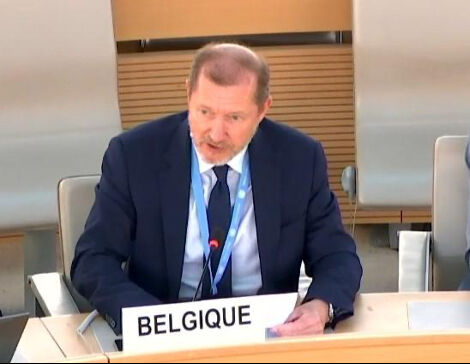 The delegate from Belgium, who spoke on behalf of the Netherlands, Luxembourg, and Belgium, said the three countries fully aligned with the Special Rapporteur’s report. He expressed condolences to those who lost dear ones in the recent capsizing of a boat in the Mediterranean Sea, which is not an isolated incident. He called for the responsibility to establish safe and legal pathways for migration, tackle the causes of migration, address its root causes and safeguard the right to life. He asked, ‘How can we put in place specialised training for early identification of trafficked persons or persons at risk of being trafficked that adequately address discrimination, weak rule of law, stigmatisation, and denial of humanitarian access, among others, which are all factors in the exploitation of vulnerable people especially in situations of large movement of refugees?’
The delegate from Belgium, who spoke on behalf of the Netherlands, Luxembourg, and Belgium, said the three countries fully aligned with the Special Rapporteur’s report. He expressed condolences to those who lost dear ones in the recent capsizing of a boat in the Mediterranean Sea, which is not an isolated incident. He called for the responsibility to establish safe and legal pathways for migration, tackle the causes of migration, address its root causes and safeguard the right to life. He asked, ‘How can we put in place specialised training for early identification of trafficked persons or persons at risk of being trafficked that adequately address discrimination, weak rule of law, stigmatisation, and denial of humanitarian access, among others, which are all factors in the exploitation of vulnerable people especially in situations of large movement of refugees?’
 The delegate of Malaysia agreed with the report of the Special Rapporteur and strongly condemned human trafficking, especially of women and children. Malaysia has strengthened its obligations by amending the Anti-trafficking of persons and Anti-smuggling of Migrants act in 2022 to clearly define acts that constitute trafficking, strengthening prosecution and conviction in trafficking cases. The country has also established a victim-care and protection committee to implement victim-centred and trauma-informed programs.
The delegate of Malaysia agreed with the report of the Special Rapporteur and strongly condemned human trafficking, especially of women and children. Malaysia has strengthened its obligations by amending the Anti-trafficking of persons and Anti-smuggling of Migrants act in 2022 to clearly define acts that constitute trafficking, strengthening prosecution and conviction in trafficking cases. The country has also established a victim-care and protection committee to implement victim-centred and trauma-informed programs.
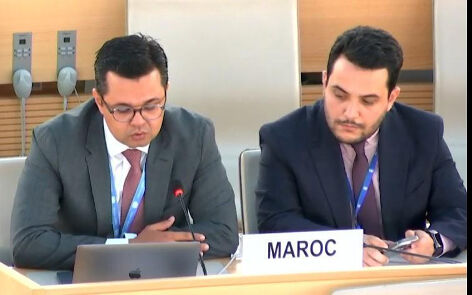 The delegate of Morocco reported that his country had adopted mechanisms to fight trafficking aimed at prevention, protection, care for victim assistance and suppression of trafficking persons. The country has set up a national commission to combat and prevent trafficking persons. In 2022, Morocco thwarted more than 40,000 attempts of illegal immigration and disbanded more than 290 trafficking networks. The country signed 80 agreements, ratified all conventions against trafficking, set up awareness programs and worked with several partners like the European Union to combat trafficking.
The delegate of Morocco reported that his country had adopted mechanisms to fight trafficking aimed at prevention, protection, care for victim assistance and suppression of trafficking persons. The country has set up a national commission to combat and prevent trafficking persons. In 2022, Morocco thwarted more than 40,000 attempts of illegal immigration and disbanded more than 290 trafficking networks. The country signed 80 agreements, ratified all conventions against trafficking, set up awareness programs and worked with several partners like the European Union to combat trafficking.
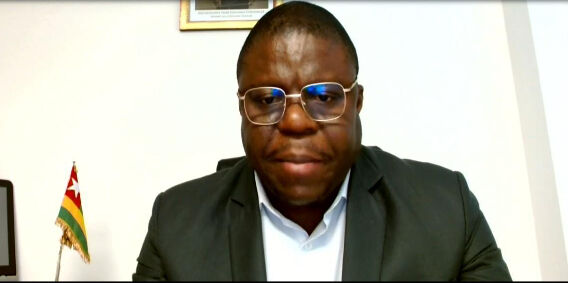 The delegate of Togo expressed gratitude to the Special Rapporteur and re-iterated that conflict and the negative impacts of climate change, among others, are contributing factors to human trafficking as they force people to flee for safety. He urged countries to pool efforts aimed at not only the prevention of trafficking but also guarantee access to asylum for victims of trafficking. Togo believes that States should urgently address statelessness, as it contributes greatly to the trafficking of persons, especially children who are victims of sexual exploitation, child labour, child marriages, and recruitment. The government created a national commission to combat trafficking of persons in 2022.
The delegate of Togo expressed gratitude to the Special Rapporteur and re-iterated that conflict and the negative impacts of climate change, among others, are contributing factors to human trafficking as they force people to flee for safety. He urged countries to pool efforts aimed at not only the prevention of trafficking but also guarantee access to asylum for victims of trafficking. Togo believes that States should urgently address statelessness, as it contributes greatly to the trafficking of persons, especially children who are victims of sexual exploitation, child labour, child marriages, and recruitment. The government created a national commission to combat trafficking of persons in 2022.
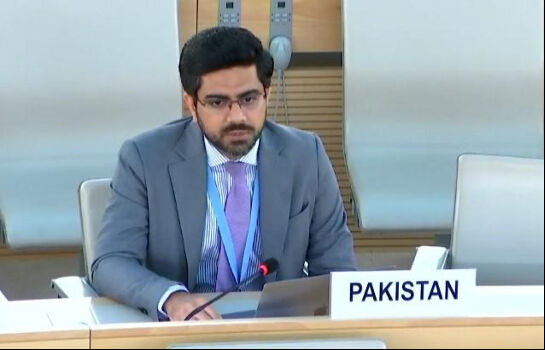 The delegate of Pakistan thanked the Special Rapporteur for her report. He informed the delegates that despite financial restraint and economic challenges, Pakistan has hosted one of the largest refugee communities in the world for over four decades. Over three million people seeking refuge in the country have been assisted. He agreed with the Special Rapporteur that climate change could aggravate conflict and create resource scarcity, negatively impacting vulnerable populations. He called for greater international cooperation and burden-sharing with States hosting refugees, especially if such States have scarce fiscal resources. He asked the Special Rapporteur what immediate steps could be taken by the international community to prevent trafficking from a human rights perspective.
The delegate of Pakistan thanked the Special Rapporteur for her report. He informed the delegates that despite financial restraint and economic challenges, Pakistan has hosted one of the largest refugee communities in the world for over four decades. Over three million people seeking refuge in the country have been assisted. He agreed with the Special Rapporteur that climate change could aggravate conflict and create resource scarcity, negatively impacting vulnerable populations. He called for greater international cooperation and burden-sharing with States hosting refugees, especially if such States have scarce fiscal resources. He asked the Special Rapporteur what immediate steps could be taken by the international community to prevent trafficking from a human rights perspective.
 The delegate of Thailand mentioned that combatting the trafficking of persons is a top priority for Thailand. To that end, national referral mechanisms were established in 2023 to increase streamlining and efficiency in victim identification and interim protection of victims. Identified victims of trafficking will receive protection and other forms of assistance and will be given temporary residence and employment opportunities. He agreed with the Special Rapporteur that there is a need to address root causes like deteriorating livelihoods, including the scarcity of food rations in camps in Bangladesh being one of the significant causes of movement the Rohingya movement. He appealed for enhanced support from donor countries in line with the burden-sharing principle.
The delegate of Thailand mentioned that combatting the trafficking of persons is a top priority for Thailand. To that end, national referral mechanisms were established in 2023 to increase streamlining and efficiency in victim identification and interim protection of victims. Identified victims of trafficking will receive protection and other forms of assistance and will be given temporary residence and employment opportunities. He agreed with the Special Rapporteur that there is a need to address root causes like deteriorating livelihoods, including the scarcity of food rations in camps in Bangladesh being one of the significant causes of movement the Rohingya movement. He appealed for enhanced support from donor countries in line with the burden-sharing principle.
Concluding Remarks
The interactive dialogue ended with the following recommendations:
- States should strengthen action to prevent trafficking in persons by expanding access to safe, regular migration pathways and to refugee protection, ensuring the protection of human rights to reduce the risks for migrants and refugees taking dangerous journeys by sea.
- States should ratify and implement international law of the sea instruments establishing the duty to rescue and regulating the conduct and coordination of rescue at sea operations by establishing search and rescue regions and maritime rescue coordination centres.
- States should ratify and implement instruments of international refugee law and human rights law providing safeguards for the rights of those in distress or rescued at sea, ensuring disembarkation to places of safety through enhanced coordination among all maritime actors, States and maritime rescue coordination centres.
Position of Geneva International Centre for Justice
Geneva International Centre for Justice (GICJ) agrees with the Special Rapporteur and State delegates that human trafficking is a multifaceted problem whose root causes, such as political unrest, climate change, and lack of food and medical care, among others, must be addressed and combatted.
There is a need for concerted efforts in addressing factors such as internal armed conflicts, scarcity of resources, weak or non-existent legal mechanisms to address injustices like sexual violence against women and children, failure to protect children against all forms of abuse, and economic challenges like poor livelihoods all contribute to human trafficking.




